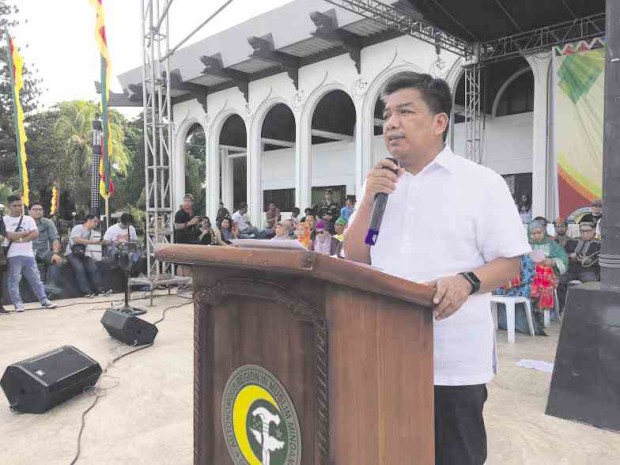DAVAO CITY—Autonomous Region in Muslim Mindanao (ARMM) Gov. Mujiv Hataman has blamed the absence of officials in some local governments in the region for the rise of armed groups that have terrorized communities in the region.
Hataman, in a gathering of ARMM governors and mayors here on Wednesday, said he was aware that “some mayors and some barangay officials are not reporting to their [town and] barangay halls or not even staying in their own municipalities.”
“Armed groups thrive in some communities because they don’t see their mayors or their barangay officials,” he said. “So, people are afraid and are forced to leave their village. It makes one community an ideal breeding place of these lawless elements,” he added.
On Wednesday, the military declared that it was conducting clearing operations against the Maute terror group, six days after its members took over a madrassa (Islamic school), a mosque and an old town hall in Butig town in Lanao del Sur province.
“A barangay official must be responsible for his own village,” Hataman said. “He must know who is new in his place and he must take action if there are crimes in his [area],” the governor said during the opening of the three-day ARMM summit, attended by more than 100 governors, mayors and members of the ARMM regional legislative assembly.
He said the region is still facing serious security problems but the only way to “strengthen the grip against terrorism and other lawless elements is to exact accountability from the local leaders.”
He called on the people to help local governments improve perceptions on the region, which affect investment confidence in the ARMM.
“Really, it is a big challenge for all of us how to fight this negative perception,” Hataman said.
He said security and poverty reduction remain the top concerns that his administration expects local leaders to address.
“We need to be more aggressive in poverty reduction,” he said. “We have all the resources and we have investors, we need to engage everyone,” he told the Inquirer in an interview.
Lawyer Laisa Alamia, ARMM’s regional executive secretary, said poverty incidence in ARMM slightly improved, from 48.7 percent in 2012 to 48.2 percent at present.
Although poverty incidence in the provinces of Tawi-tawi, Basilan and Maguindanao went down, the province of Sulu continued to lag behind.
Tawi-tawi posted a 21.9 percent poverty incidence in 2012, which dropped to 10.9 percent in 2015. Basilan, which posted a 32.1 percent poverty incidence in 2012, posted 28.3 percent last year.
Poverty incidence in Maguindanao, at 54.5 percent in 2012, dropped to 48.8 percent last year.
Poverty incidence in Sulu, however, increased from 40.2 percent in 2012 to 49.6 percent last year.
Maguindanao Gov. Esmail Mangudadatu attributed the drop in poverty incidence in his province to the entry of investors.
“These investors provide jobs for our people… Each hectare of banana plantation employs one to two workers. A thousand hectares employ almost 2,000 workers. Our concern always is the need to protect our investors because they give employment to our people,” he said.
Hataman also cited the Basilan provincial government for taking the lead in fighting Abu Sayyaf bandits and for enticing investors to come in.
Basilan Gov. Jim Saliman, however, admitted that it is still difficult to invite foreign investors as the province struggles to combat the negative perception brought about by the presence of the Abu Sayyaf.
